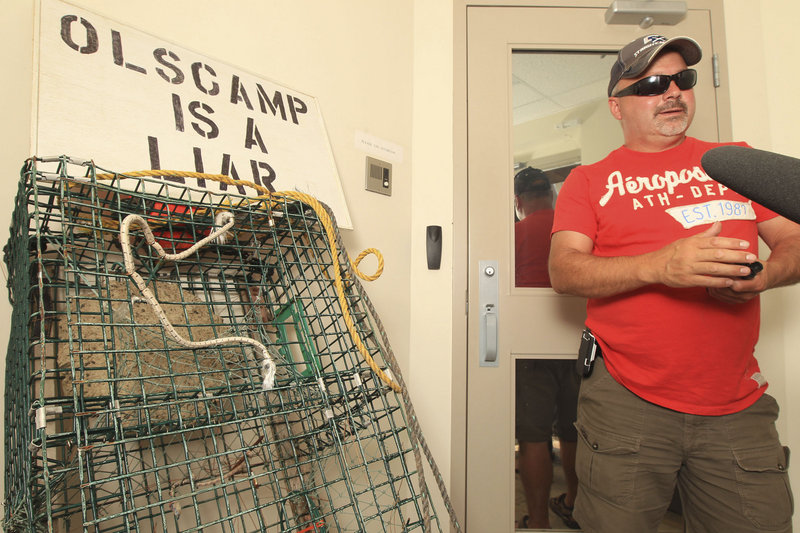FREDERICTON, New Brunswick — An international dispute over sales of Maine lobsters in Canada intensified Wednesday, with Canadian lobstermen demanding higher prices for their catch while continuing to prevent imported lobsters from reaching processors.
In the U.S., the matter reached the desk of Secretary of State Hillary Clinton when Maine’s Sen. Olympia Snowe urged her to investigate the growing protests in New Brunswick and other eastern provinces.
“This is an unacceptable situation that must be rectified immediately,” said Snowe, who warned that the dispute could be economically devastating to Maine lobstermen, who are getting low prices for their catch on both sides of the border.
Snowe told Clinton that the protests are the result of “some disgruntled Canadian lobstermen, in a misguided attempt to protest the low retail price of lobster.” She asked that the issue be made “a priority” in U.S.-Canada relations.
In Fredericton, New Brunswick’s capital, protesters tossed lobster traps into the office of federal fisheries minister Keith Ashfield in an effort to get him to intervene.
Ashfield was not in the office, but the protesters succeeded in getting a meeting with him scheduled for Friday. It’s not clear whether a deal will be reached.
Marc Cormier, 33, a third-generation lobsterman from Pointe-Sapin, was among the demonstrators who waited in the heat outside Ashfield’s office. He said, “We’re barely making the payments on our boats.”
Beside him, his friend and fellow boat captain Pascal Mazerolle said the fishermen will not put out traps until they are guaranteed $4 a pound for their catch.
“With the prices the lobster shops are offering, you’re going out there and you’re paying to fish. It doesn’t make sense,” said Mazerolle, 38, who has been fishing for 22 years.
The demonstration, involving about 200 fishermen and their supporters, later moved to the Legislative Assembly in downtown Fredericton, where protest leaders convinced provincial fisheries minister Mike Olscamp to have a private meeting.
New Brunswick Premier David Alward, who spoke Wednesday with Maine Gov. Paul Le-Page, said he has been working to facilitate discussion among all parties.
“There have been unacceptable actions by a few fishermen but we have had a long and fruitful relationship with Maine on trade and commerce,” Alward said in an interview late Wednesday in Fredericton.
The issue has plagued Maine lobstermen for weeks. A glut of soft-shell lobsters this season has depressed the prices that lobstermen have been getting for their catch, to well below $3 a pound.
Last month, Maine lobstermen stayed off the water for several days to try to let the market rebound. It didn’t, and now the problem has spread to Canada, where about half of all Maine lobsters are processed.
New Brunswick’s lobstermen don’t want their processors buying Maine lobsters for such low prices and hope that their provincial government will step in. But processors are paying what the market will bear, about $2.50 to $3 per pound.
Canadian lobstermen want $4 a pound for the lobsters they catch when their season starts.
Lobstering in the Northumberland Strait, between New Brunswick and Prince Edward Island, was supposed to begin this week, but fishermen say they won’t go out before Monday, putting more pressure on the Canadian government and processors to find a solution.
Alward said New Brunswick will not subsidize lobster prices. It has offered some compensation to lobstermen in the form of deferred loan payments, but the lobstermen’s union has rejected the offer.
In the last several days, lobstermen have blocked the entrances of some processors in New Brunswick, Nova Scotia and Prince Edward Island. Some observers, including Snowe, fear that those confrontations could turn violent.
Officials at the U.S. Embassy in Canada told Snowe’s office that the senator’s concern about “acts of intimidation, violence, or coercion” were forwarded to Royal Canadian Mounted Police in New Brunswick.
Alward said he is concerned about safety, too, but is confident that cooler heads will prevail.
Sen. Susan Collins and Reps. Chellie Pingree and Mike Michaud also have pressured Canadian officials to resolve the matter.
Like Snowe, Michaud contacted the State Department, saying the protests have the potential to harm lobstermen and create “a safety concern for our truckers” who take the catch to Canadian plants.
Patrick Keliher, Maine’s marine resources commissioner, said there may not be many trucks carrying lobsters north, with “a majority” of Canada’s 32 processing plants expected to be closed over the next few days.
Keliher said a handful of processors, particularly on Prince Edward Island, are agreeing to process only the Maine lobster they have on hand and won’t take any more shipments.
Mainers who rely on lobsters for their livelihood can do little but watch.
Pete Daley, vice president of Garbo Lobster in Hancock, had one of his trucks stopped in New Brunswick last week. He hasn’t sent out any lobsters since then.
“We’re in daily communication with the processors, but until they tell me I can ship our product, we’re not going to risk it,” he said Wednesday from his company’s headquarters. “It’s a volatile situation and I don’t want to say anything to inflame it.”
With Canadian processors not taking Maine lobsters, Keliher said he’s worried about a backlog of lobster.
Maine lobstermen had pinned their hopes for higher prices on Canadian plants, which didn’t take shipments until they started catching lobsters whose shells were hard enough to survive the transport.
Keliher said prices paid to lobstermen in Maine on Tuesday were about $2.25 to $2.75 a pound, near last month’s record lows.
In Scarborough, lobstermen were getting $2.35 a pound for soft-shell lobsters and about $5 a pound for hard shells on Wednesday, said Susan Bayley of Bayley’s Lobster Pound.
Bayley said she expects the price for soft shells will fall back near historic lows of about $2 a pound within a few days.
“We expect to see a drop in the boat price by Monday,” she said. “There will be a backup because of what’s happening in Canada. Supply is going to get larger and larger, and if there’s no place to send them, there’s going to be too much.”
Maine lobstermen expressed sympathy for the Canadians’ plight but decried their tactics.
“The Maine Lobstermen’s Association is in complete sympathy with the economic situation facing Canadian fishermen but strongly rejects methods that disrupt, threaten, interfere with or otherwise impose obstacles on international commerce,” said Patrice McCarron, the association’s executive director, said in a written statement.
“Maine and Canadian lobster industries have long shared a collaborative, constructive relationship that respects and facilitates vigorous competition,” the statement said. “The MLA urges protesting fishermen to end their interference with shipments of Maine lobster and work to resolve their issues with government and processing plants.”
Alward, the New Brunswick premier, said he doesn’t know what the next step will be but everyone is working to find a solution.
John Chilibeck of the Telegraph-Journal in St. John, New Brunswick, contributed to this report.
Staff Writer Edward D. Murphy can be contacted at 791-6465 or at:
emurphy@pressherald.com
Staff Writer Eric Russell can be contacted at 791-6344 or at:
erussell@pressherald.com
Send questions/comments to the editors.



